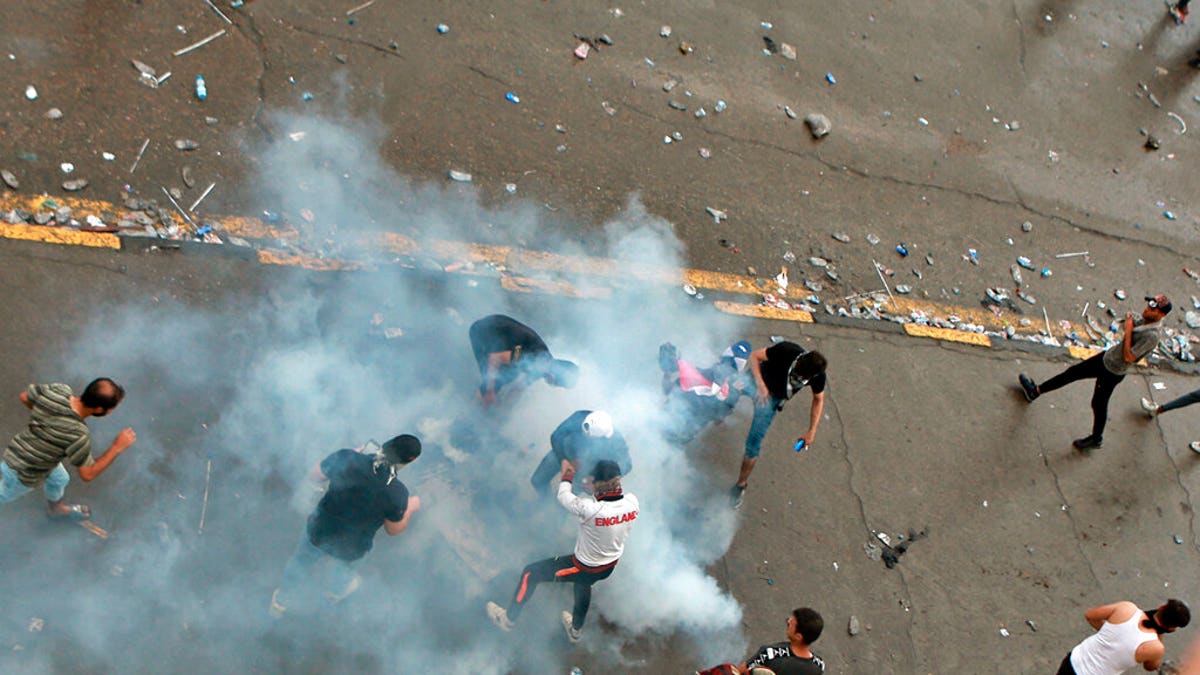Fox News Flash top headlines for Nov. 2
Fox News Flash top headlines for Nov. 2 are here. Check out what's clicking on Foxnews.com
Iraqi security forces killed at least one anti-government protester Saturday and wounded at least 200 more in the capital Baghdad and in the south of the country, police officials said.
Tens of thousands of Iraqis have been protesting over the past month, demanding a sweeping overhaul to the country's political system due to deteriorating living conditions, high unemployment, and corruption.
In Baghdad, security forces fired tear gas at protesters who tried to cross to bridges over the Tigris River leading to the heavily fortified Green Zone, home to the Iraqi government and foreign embassies. “Down with the government, down with the regime and down with corrupt parties,” some of the protesters chanted.

Anti-government protesters close downtown a street in Baghdad Wednesday.
On Oct. 29, masked security forces killed eighteen people when they opened fire on protesters in the Shiite holy city of Karbala.
LEBANON PARALYZED BY NATIONWIDE PROTESTS OVER PROPOSED TAXES
In total, 250 have died as a result of the protests. As of Oct. 22, an Iraqi government committee revealed that security forces alone had killed 149 people by using excessive force. The report said that 70 percent of the deaths were caused by shots to the head or chest. It held senior commanders responsible but stopped short of blaming Prime Minister Adel Abdul Mahdi or other top officials.

Iraqi security forces fire tear gas to disperse anti-government protesters during a demonstration in Baghdad last week. (AP Photo/Khalid Mohammed)
“The committee found that officers and commanders lost control over their forces during the protests [and this] caused chaos,” the panel said in its report. “There were no official orders from the supreme authorities to security forces to open fire toward protesters or use live ammunition at all.”
MASKED IRAQI SECURITY FORCES OPEN FIRE ON PROTESTERS, KILLING 18: REPORT
Mahdi established the committee to look into the bloodshed. He’s also promised a cabinet reshuffle and other reforms, but protesters say it is not enough.
Despite its vast oil wealth, Iraq suffers from high unemployment and crumbling infrastructure, with frequent power outages that force many to rely on private generators.
CLICK HERE FOR THE FOX NEWS APP
The demonstrations have occurred in Shiite-majority areas and have been directed at the Shiite-dominated government and Shiite political parties and militias, many of which are supported by neighboring Iran. Iran also backs the government of Lebanon, which has seen similar protests. Lebanon has one of the largest national debt to gross domestic product (GDP) ratios in the world, and also faces accusations of corruption. On Oct. 29 the Lebanese prime minister stepped down amidst the unrest.
An increasingly violent crackdown in Iraq has raised fears of a backlash by Iran and its heavily armed local allies.
Iraq's Foreign Ministry called on countries that issued statements urging Iraq's government to respect the will of Iraqis, saying those states "should respect Iraq's sovereignty and not interfere in Iraq's internal affairs."
The Associated Press contributed to this report.









































